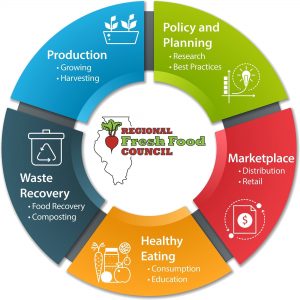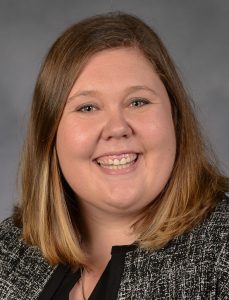Advocates push for building regional, sustainable food systems
By Tim Alexander for Chronicle Media — April 8, 2020
The Regional Fresh Food Council, formed in 2015, is a “collective effort to make healthy food available and accessible with a stronger local food economy,” according to its website. The council outlined its mission for creating a “thriving food system.” (Graphic courtesy of Regional Fresh Food Council)
Participants of a local food conference met at East Peoria’s Embassy Suites Conference Center to discuss the importance of regional food system stakeholders coming together to form councils and advocacy groups, with the goal of effecting change in the ways consumers receive food.
To that effect, segments of the Illinois Farm Bureau-Illinois Farmers Market Association’s 2020 Live Local Conference held in March focused on how stakeholders in Peoria and Chicago are cooperating to forge more socially, economically and environmentally conscious food systems.
But in the days following the extensive conference, while most Americans hunkered down in their homes due to the threat of the novel coronavirus, or COVID-19, with supermarket shelves bare of essentials, the importance of a safe, reliable and sustainable local food system took on even greater significance.
“It was a very different world when we left compared to when we got to the conference,” said Raghalla Scavuzzo, assistant director of food systems development for the farm bureau, “but we were very pleased with its results. The people who attended were mighty and passionate, and walked away being complimentary of what they had learned about increasing profitability on their farms. Ultimately this conference is about building the infrastructure that leads to business development.”
A highlight of the Live Local Conference was an appearance by Illinois Lt. Gov. Juliana Stratton, who showed her passion for Illinois’ ag industry by unveiling a campaign promoting the diversity of Illinois’ agriculture and farmers.
She also discussed the importance and impact that specialty crops have on the state economy — pumpkins alone contribute $200 million annually — and how small farm operations connect consumers and producers at a grassroots level.
“Over the past year, the lieutenant governor has visited farms around the state and become very impassioned about food production and access to communities, and is inspired to promote these food and farm businesses,” said Scavuzzo. “She wants people to know what is happening in Illinois and came here to highlight all the Illinois products that we are so proud of. They are going to be highlighting some of our farms and businesses around the state, once we are not amid the coronavirus any longer. She wants to show how our communities collaborate and work together.”
Stratton’s new campaign focuses on buying local and highlights how local businesses, such as Kathy’s Kitchen of Virginia, Illinois, and Pottstown Meats and Deli in Peoria, are working together with small agricultural producers to serve a growing market of consumers concerned with product sourcing, processing and distribution. Kathy’s Kitchen products can be found in various shops throughout the state
The demand for locally-sourced food products was acknowledged in Peoria County in 2015, with the issuance of the first, 33-county “Local Foods Resource Guide,” a 12-page listing of farmer’s markets, community supported agriculture (CSA) programs, farm stands, u-pick farms and orchards, and restaurants that source food from local producers.
Peoria recently received a Local Foods, Local Places grant to integrate local foods into their strategic plan. Prior to receiving the grant from the United State Department of Agriculture, Peoria had already established a five-county regional fresh food council, along with monthly food system economic events.
“We want to encourage new ways to collaborate because that’s really what will lead to tangible outcomes,” said Tory Dahlhoff, communications and outreach director for the Greater Peoria Economic Development Council, which is leading Peoria’s regional fresh foods council.
The new fresh foods consortium includes Woodford, Mason, Tazewell, Logan and Peoria counties.
“The council was developed for these counties to come together and develop infrastructure and collaborate in bringing local foods into their economic development goals,” Scavuzzo explained. “The communities are identifying what their needs are not only in terms of food, but how local food can contribute to their economic development. Through the grant, the south side of Peoria is developing a farmer’s market, a food co-op and a place to aggregate food. (Food council members) are developing strategies for building communities up.”
Marlie Wilson, a representative from the Chicago Food Policy Action Council, came to the conference to discuss ways Chicago has shifted a large portion of their public and institutional food spend to local producers. Spurred by the Good Food Purchasing Policy adopted by the City of Chicago and Cook County, public departments and agencies, along with other community anchor institutions, are compelled to shift their food spending toward local, sustainable, fair and humane practices.
The adoption of the Chicago policy has led to better food, transparency, and more racial and social equity across the food chain, Wilson told attendees. She also shared how local government and organizational partners can collaborate to create new market opportunities for local food producers and food businesses.
Such collaborations, once in place, could help sustain the lifeblood of communities facing disaster scenarios — such as the COVID-19 threat, which has resulted in shutdowns statewide — by lessening consumer dependence on outside food sources and deliveries.
“What we are seeing in light of this is that agriculture and food access is integral to communities, and if the grocery stores can’t serve the communities, it is important to work together to have in place a cooperative delivery system from farms to businesses,” Scavuzzo said. “Access to safe food is critical, and when you know your farm you know your business.”
The Illinois Stewardship Alliance is working to grow the local food economy in the state, forming a Good Food Purchasing Policy task force that is tasked with assessing the current state of procurement and market opportunities by Illinois state agencies.
The annual Food and Farm Lobby Day, which was originally set for April 2 in Springfield, was held virtually due to the coronavirus threat. The importance of local food systems will certainly be a matter of great discussion with state legislators.
Go to the Regional Fresh Food Council Facebook page for updates on how the organization is reaching out to the community to help deliver meals and other services during the COVID-19 shutdown.









